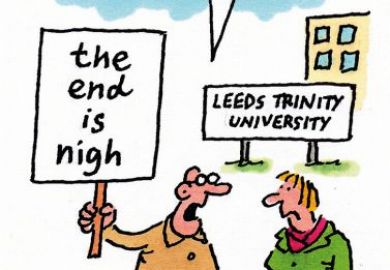
“Hey Oxford reject, you’re always gonna be a reject, you’re still a reject in my eyes” – so ran a lyric in one of the songs by Bob Nylon and the Elastic Band, a group of University of Oxford undergraduates whose one-time guitarist has grown up to be the UK’s new universities and science minister. Chris Skidmore’s appointment on 5 December prompted fresh scrutiny of the band’s dubious back catalogue, exposed by the Daily Mirror last year. The minister – who previously apologised for the “joke lyrics” – has progressed from his days playing songs with titles such as God Hates Puffs and Women Are Crap. More latterly, he was a co-author, with four fellow Conservative MPs, of Britannia Unchained, a book that described British workers as “among the worst idlers in the world”. Mr Skidmore’s appointment means that four of the five Conservative universities ministers since 2010 have been Oxford men (the other was a Cambridge graduate). Bob Nylon and the Elastic Band were infantile undergraduates when they wrote Oxford Reject – but by some outlandish coincidence, those in charge of ministerial appointments seem to share the band’s attitudes.
Given the educational background of ministers recruited to work in the Department for Education, it was a bit rich for Damian Hinds, the education secretary, to lament that Britain has become a nation of “snobs” who think that university is the only route to a good job, critics observed. In a speech on 6 December, Mr Hinds announced that there would be a new generation of higher technical qualifications at Level 4 and Level 5, Tes reported. This is the alternative to bachelor’s degrees advocated by the Association of Colleges, which appears to have scored a major lobbying success. The AoC has also lobbied the government’s post-18 education review to lower tuition fees and to cap student numbers on bachelor’s degrees – which might make higher education’s representatives, led by Universities UK, ever more nervous about being outflanked in the review. Of course, as the review is so closely tied to the prime minister who created it, its prospects for implementation might have the lifespan of the average turkey.
Students are not noted for their refined eating habits – but some of them might baulk at a new offering at Ohio State University. “A bacon vending machine has been installed at the College of Food, Agricultural, and Environmental Sciences on the university’s Columbus campus. It offers cooked bacon strips and bacon bits for $1 [79p],” the Associated Press reported on 7 December. Proceeds from machine, sponsored by the Ohio Pork Council, will “go toward Ohio State’s meat science programme”, added AP, sagely. The phrase “pork barrel politics” has always prompted puzzlement over what a “pork barrel” actually is. Ohio State, it seems, has found the pork barrel, seen that it could be used for university funding and is scraping it hard.
The Brexit vote exposed the fissure between graduates and non-graduates as a key divide shaping the UK’s politics. Understandable, then, that Universities UK launched a campaign to demonstrate the positive impact that universities have on people’s lives on 6 December. However, it is open to question whether a PR-led campaign fronted by wealthy celebrities will bridge the divides. The Made At Uni campaign launched with a video featuring the actor James Nesbitt, whose opening claim was that “a UK university was the first to set out the rules of football”. Rather than this being an act of proto-knowledge transfer by the University of Cambridge, undergraduates there made an early attempt to codify a set of rules, although they still allowed for the catching of the ball, as academic researchers of early football have explained. But scholarly nitpicking should not trouble universities when they have PR points to score.
Who has the power to start lifelong friendships, to conjure into being relationships or marriages that eventually create new lives, or to leave people consumed by rage as bass shakes their walls at 3am? Not God, not fate, but university administrators. On 8 December, the BBC News website revealed universities’ “perhaps surprising policies on how rooms are allocated”, following a Freedom of Information request. The University of Strathclyde said, in the manner of an extremely considerate and genteel Edwardian-era Scottish landlady: “We would try to place tidy people together. We would avoid placing morning and night people together as their sleep patterns would clash.” Meanwhile, “Bedford’s FOI reply” (presumably the University of Bedfordshire’s) “included promotional material for a specialised commercial algorithm it employs using personality and lifestyle factors”, which it claims leads to “lower levels of conflict and a better sense of community”. If a UK university has a magical algorithm that ensures community peace, surely it should be obliged to share it with the whole of the nation.
Register to continue
Why register?
- Registration is free and only takes a moment
- Once registered, you can read 3 articles a month
- Sign up for our newsletter
Subscribe
Or subscribe for unlimited access to:
- Unlimited access to news, views, insights & reviews
- Digital editions
- Digital access to THE’s university and college rankings analysis
Already registered or a current subscriber?



